人教版必修3 Unit 1 Festivals around the world Period 2 Learning about Language课件(共30张PPT)
文档属性
| 名称 | 人教版必修3 Unit 1 Festivals around the world Period 2 Learning about Language课件(共30张PPT) | 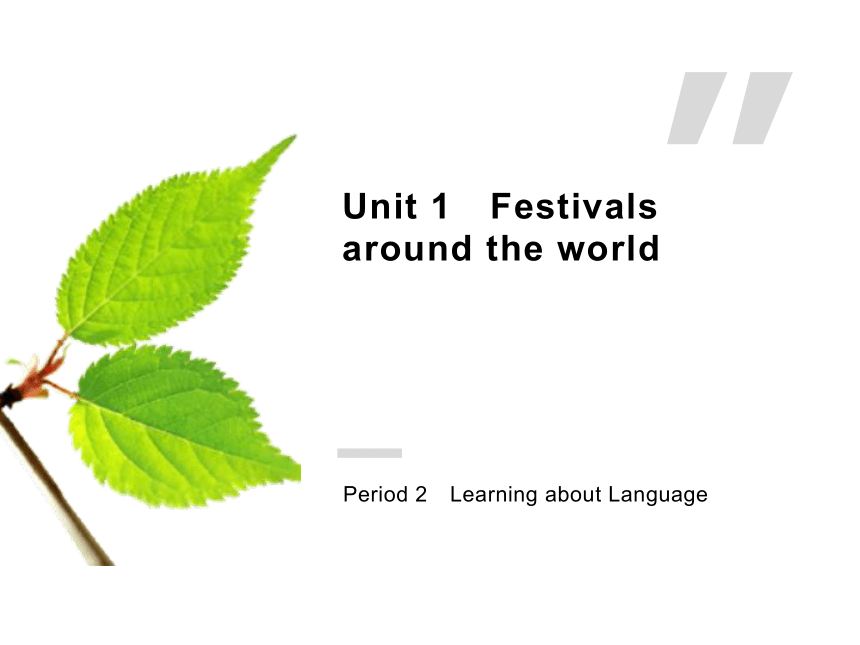 | |
| 格式 | zip | ||
| 文件大小 | 518.1KB | ||
| 资源类型 | 教案 | ||
| 版本资源 | 人教版(新课程标准) | ||
| 科目 | 英语 | ||
| 更新时间 | 2020-03-25 16:33:09 | ||
图片预览

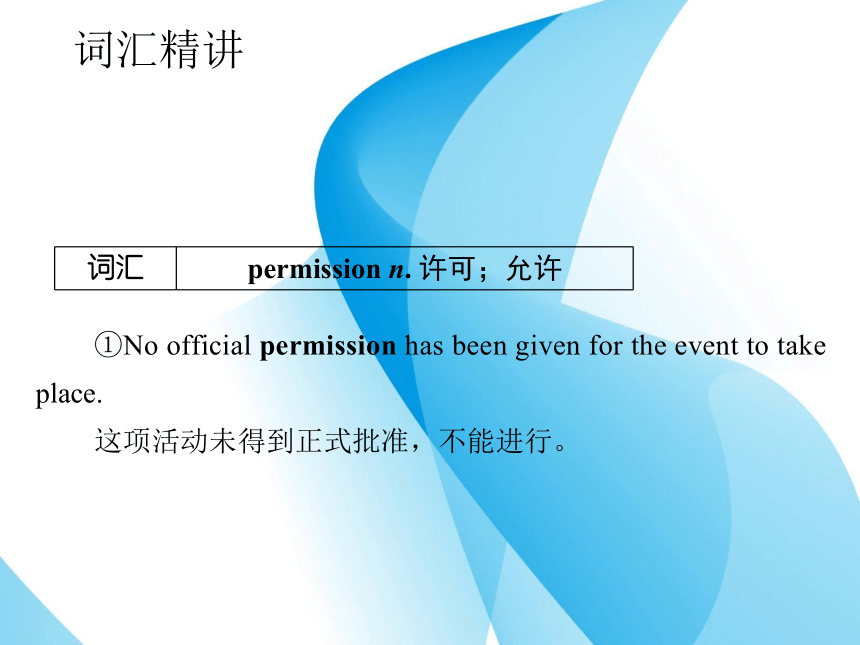
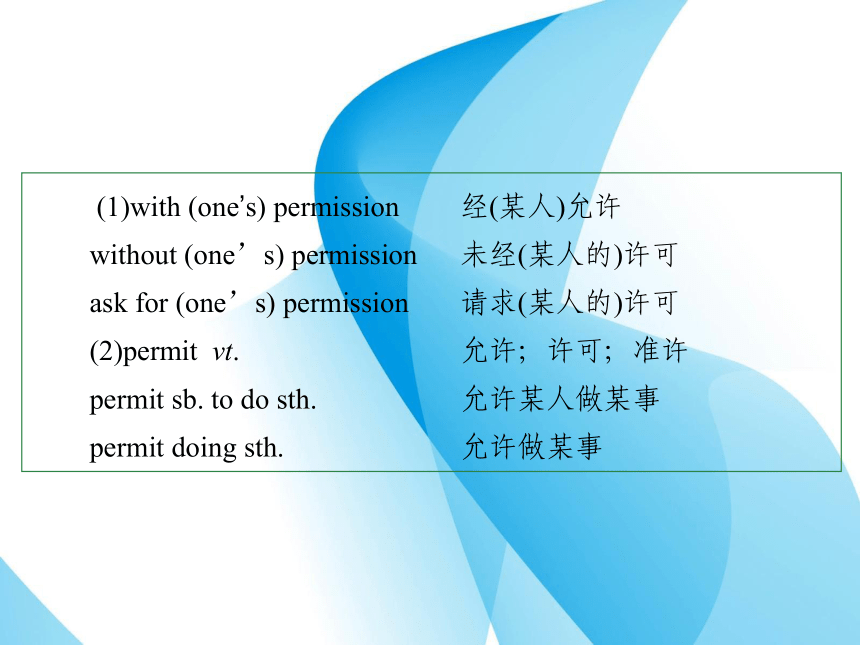
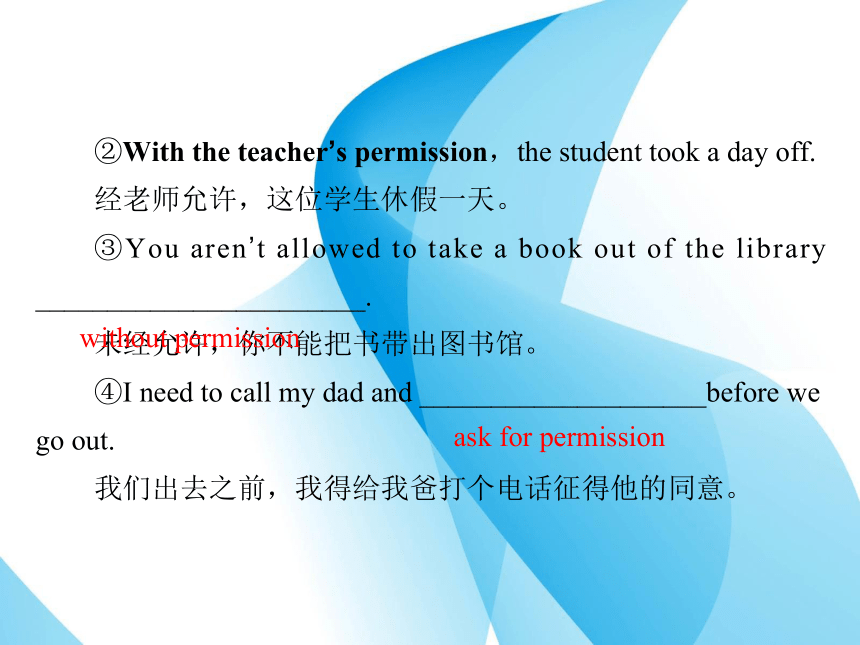
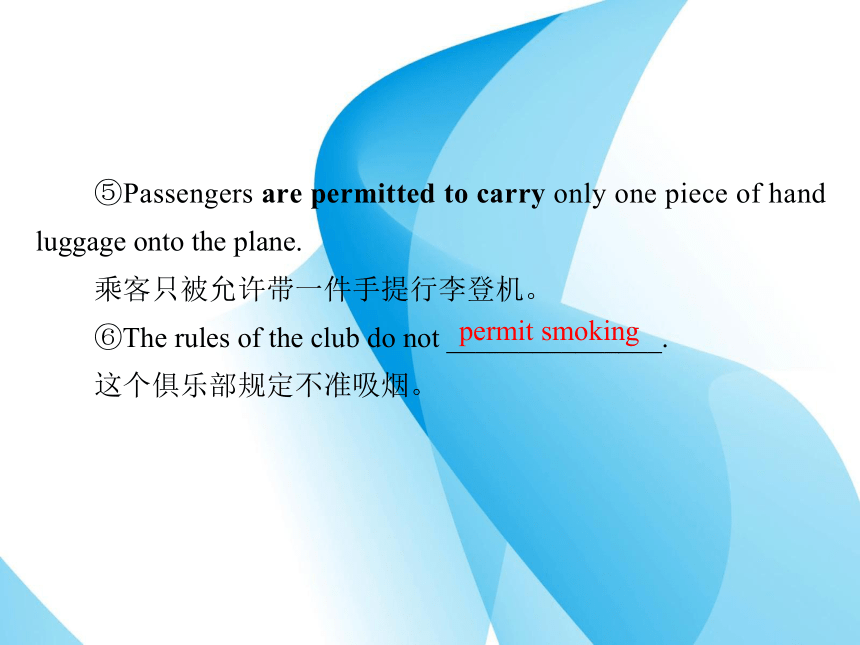
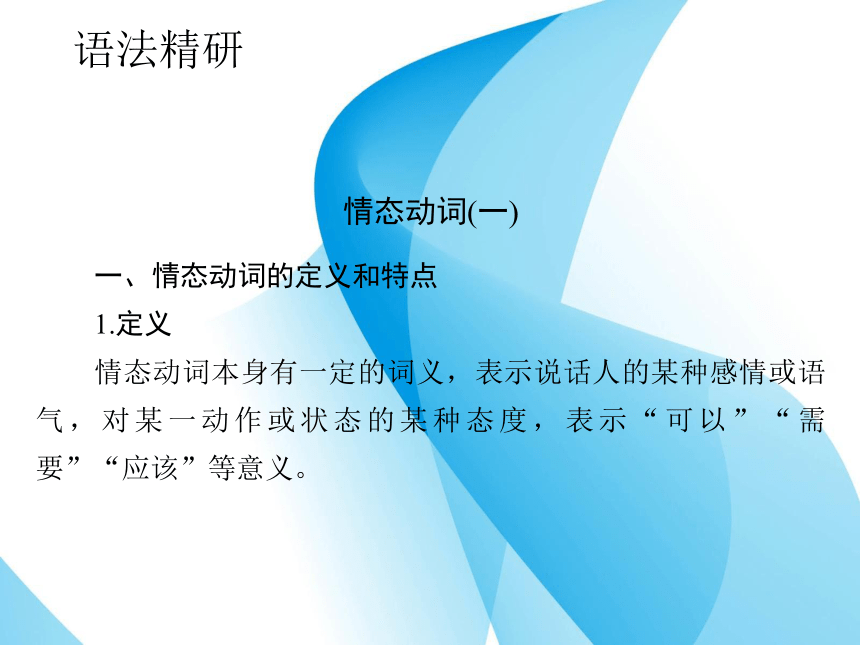
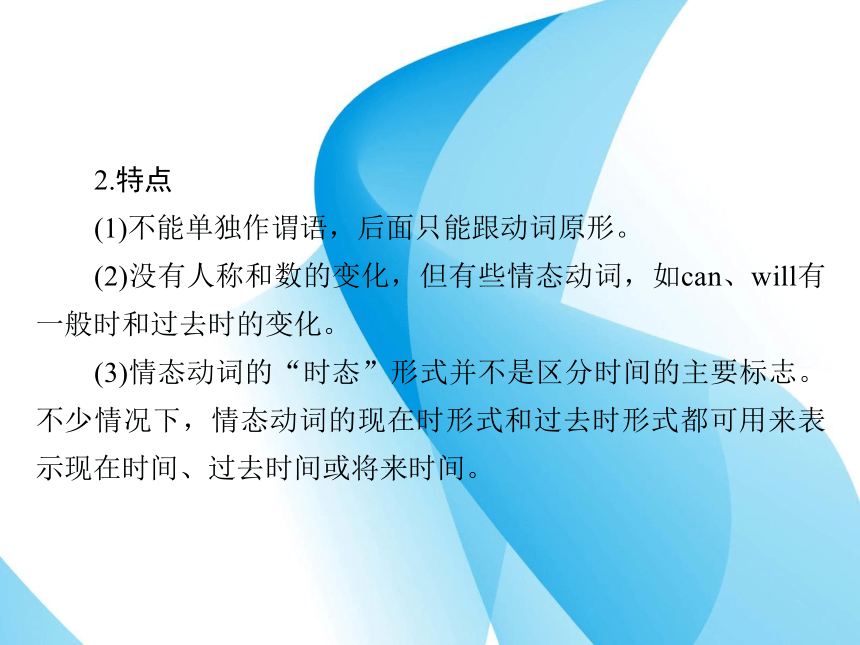
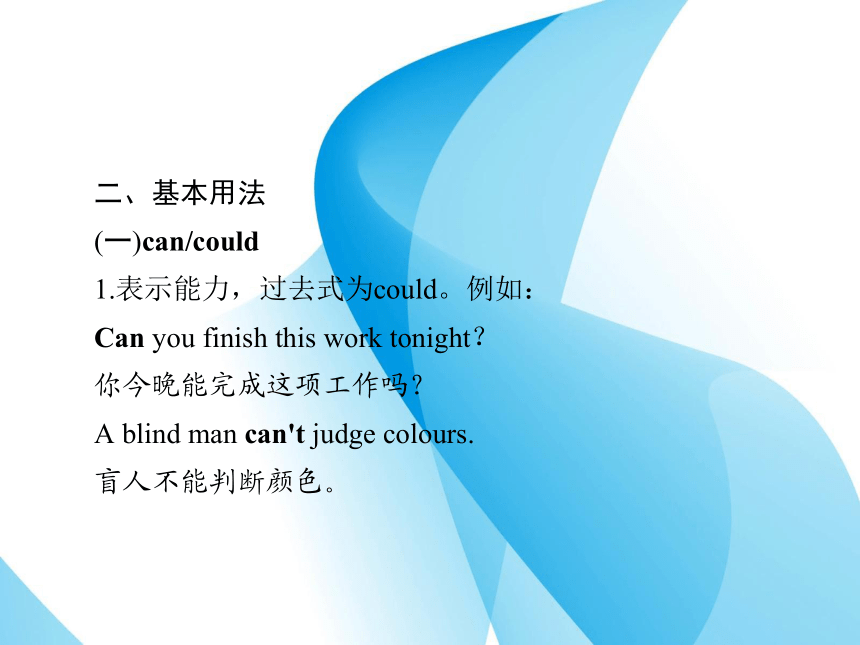


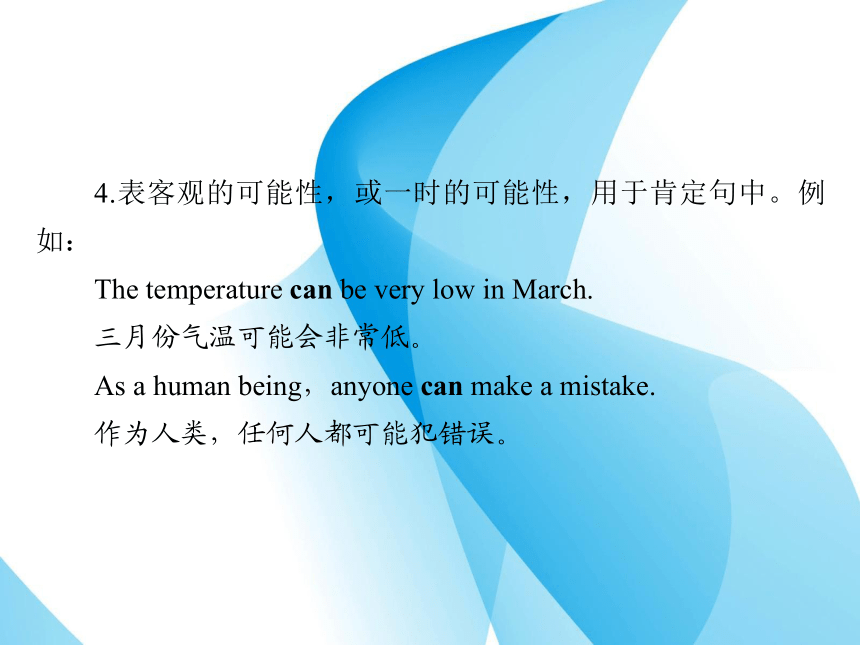
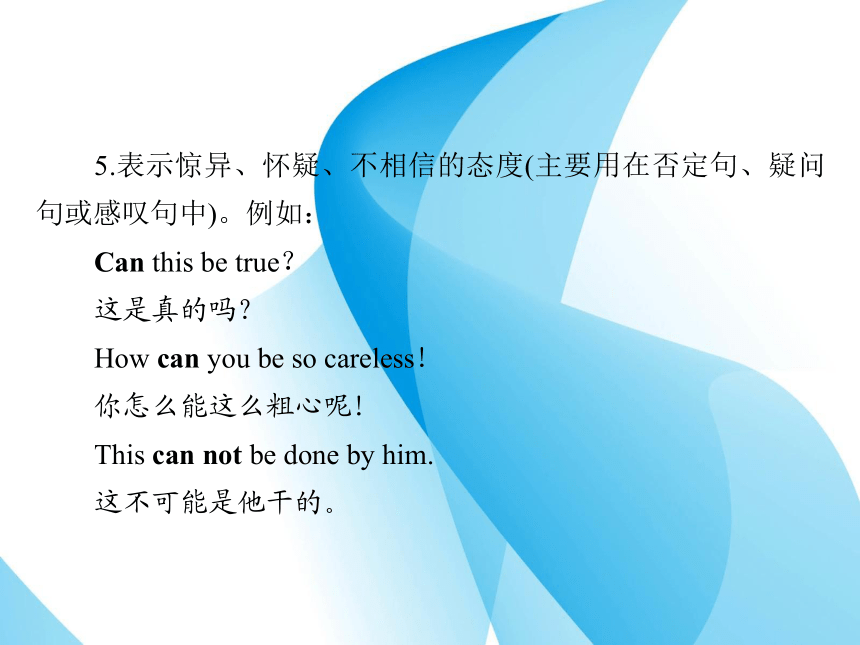
文档简介
(共30张PPT)
”
Period 2 Learning about Language
Unit 1 Festivals around the world
①No official permission has been given for the event to take place.
这项活动未得到正式批准,不能进行。
词汇 permission n. 许可;允许
词汇精讲
(1)with (one’s) permission 经(某人)允许
without (one’s) permission 未经(某人的)许可
ask for (one’s) permission 请求(某人的)许可
(2)permit vt. 允许;许可;准许
permit sb. to do sth. 允许某人做某事
permit doing sth. 允许做某事
②With the teacher’s permission,the student took a day off.
经老师允许,这位学生休假一天。
③You aren’t allowed to take a book out of the library _______________________.
未经允许,你不能把书带出图书馆。
④I need to call my dad and ____________________before we go out.
我们出去之前,我得给我爸打个电话征得他的同意。
without permission
ask for permission
⑤Passengers are permitted to carry only one piece of hand luggage onto the plane.
乘客只被允许带一件手提行李登机。
⑥The rules of the club do not _______________.
这个俱乐部规定不准吸烟。
permit smoking
一、情态动词的定义和特点
1.定义
情态动词本身有一定的词义,表示说话人的某种感情或语气,对某一动作或状态的某种态度,表示“可以”“需要”“应该”等意义。
情态动词(一)
语法精研
2.特点
(1)不能单独作谓语,后面只能跟动词原形。
(2)没有人称和数的变化,但有些情态动词,如can、will有一般时和过去时的变化。
(3)情态动词的“时态”形式并不是区分时间的主要标志。不少情况下,情态动词的现在时形式和过去时形式都可用来表示现在时间、过去时间或将来时间。
二、基本用法
(一)can/could
1.表示能力,过去式为could。例如:
Can you finish this work tonight?
你今晚能完成这项工作吗?
A blind man can't judge colours.
盲人不能判断颜色。
2.表示请求和允许。此时用could表示请求语气更委婉。could主要用于疑问句,不可用于肯定句,答语应用can(即could不能用于现在时态的简略答语中)。例如:
—Could I come to see you tomorrow?
——明天我可以来见你吗?
—No,I'm afraid not.
——不,恐怕不行。
—Can I go now?
——我现在可以走吗?
—Yes,you can.
——是的,可以。
3.表推测,意为“可能”,多用于疑问句和否定句中。例如:
Can they have missed the train?
他们可能会误了火车吗?
That can not be Jenny,for she is in hospital.
那不可能是珍妮,因为她在住院。
4.表客观的可能性,或一时的可能性,用于肯定句中。例如:
The temperature can be very low in March.
三月份气温可能会非常低。
As a human being,anyone can make a mistake.
作为人类,任何人都可能犯错误。
5.表示惊异、怀疑、不相信的态度(主要用在否定句、疑问句或感叹句中)。例如:
Can this be true?
这是真的吗?
How can you be so careless!
你怎么能这么粗心呢!
This can not be done by him.
这不可能是他干的。
6.“can(could)+have+过去分词”的疑问或否定形式表示对过去发生的行为的怀疑或不肯定。例如:
He can not have been to that town.
他不可能去过那个城镇。
Can he have got the book?
他已得到那本书了吗?
(二)may/might
1.表示许可。
表示请求、允许时,might比may的语气更委婉一些,回答时(口语中)常用:No,you can’t.或Yes,please。用mustn’t表示“不可以”“禁止”“阻止”之意(具有强烈禁止的意思)。如:
You may drive the car.
你可以开这辆车。
—Might I use your pen?
—No,you mustn’t.
——我可以用你的钢笔吗?
——不,绝对不行。
用“May I...”征询对方许可在文体上比较正式,在口气上比较客气。用“Can I...”征询对方意见,在现代口语中更为常见。
2.用于祈使句中表示祝愿。如:
May you succeed!
祝你成功!
3.表示推测,may多用于肯定句和否定句,其否定句用may not表示“可能不”之意。might比may可能性更小。如:
She may be very busy now.
她现在可能非常忙。
4.may/might have done表示对过去发生的动作没有把握的推测。如:
He may/might have known the news.
他或许已经知道这个消息了。
5.may/might as well不妨,倒不如。例如:
You may as well close the door when you leave.
你走时不妨把门关上。
(三)will/would
1.表示请求、建议等,would比will语气委婉客气。例如:
Would you pass me the book?
你能递给我那本书吗?
Will you lend me your book?
你能把你的书借给我用用吗?
2.表示意志、愿望和决心。例如:
I will never do that again.
我再也不会那样做了。
They asked if we would do that again.
他们问我们是否还会那样做。
3.表示习惯性动作,would表示过去习惯时,常指过去反复发生的动作或某种倾向,其后只接表动作的动词。而used to既可以接动作动词,也可以接状态动词,且表示“现在已不那样了”。例如:
Pigs will eat anything.
猪什么都吃。
During the vacation he would visit me every week.
假期里他每周都来看我。
The door won’t open.
这门打不开了。
4.表料想或猜想。例如:
It would be about ten when he left home.
他离开家时大约十点了。
I thought he would have told you all about it.
我想他已经把一切都告诉你了。
(四)shall/should
1.shall的用法:
(1)shall用于第一、第三人称疑问句中,表示说话人征求对方的意见或向对方请示。例如:
Shall he wait outside the door?
让他在门外等着吗?
When shall he be able to leave the hospital?
他什么时候可以出院?
(2)shall用于第二、第三人称,表示说话人给对方命令、警告、允诺或威胁。例如:
You shall fail if you don’t work harder.
如果你不更加努力,你就会不及格。(警告)
He shall have the book when I finish reading.
我看完这本书后就给他。(允诺)
He shall be punished.
他会受到惩罚的。(威胁)
(3)在法律、条约、规章制度等中表示“应该”。
According to the agreement,the interests shall be divided into four parts.
根据协议,利息应该被分成四部分。
2.should的用法:
(1)should表示劝告、建议、命令,其同义词是ought to;在疑问句中,通常用should代替ought to。例如:
You should go to class right away.
你应该立刻去上课。
(2)should还可以表示按常理推测,意为“可能,按道理应该”。例如:
They should be there by now,I think.
我想,他们现在该到那儿了。
(3)should还可以用在if引导的条件从句中表示虚拟语气。例如:
Ask her to ring me up if you should see her.
万一你见到她,请让她给我打个电话。
Should I(If I should) be free tomorrow I will come.
我明天有时间的话,我就来。
(4)“should+have+过去分词”结构表示“应该做到而实际上没有做到”,并包含一种埋怨、责备的口气。例如:
I should have helped her,but I never could.
我本应该帮助她的,但我没有。
You should have started earlier.
你本可以开始得更早些。
(五)must
1.must表示“必须”,语气比should,ought to强烈,其否定形式是mustn’t,表示“禁止、不准”。例如:
You must practise your spoken English if you want to improve.
你要想提高英语水平,就必须加强口语练习。
2.must表推测,意为“一定、准是”,只能用在肯定句中。例如:
You must be very tired after such a long walk.
走了这么长的路你一定很累了。
3.must有“干嘛偏要……,偏偏”的意思。例如:
I’m sleeping now.Must you make so much noise?
我在睡觉。你干嘛偏要弄出这么大的声音?
4.“must have+过去分词”结构表示“肯定发生过某事”。表示比较有把握的推测。
It must have rained last night,for the road is wet.
昨晚一定下雨了,因为地面湿了。
谢谢观看!
”
Period 2 Learning about Language
Unit 1 Festivals around the world
①No official permission has been given for the event to take place.
这项活动未得到正式批准,不能进行。
词汇 permission n. 许可;允许
词汇精讲
(1)with (one’s) permission 经(某人)允许
without (one’s) permission 未经(某人的)许可
ask for (one’s) permission 请求(某人的)许可
(2)permit vt. 允许;许可;准许
permit sb. to do sth. 允许某人做某事
permit doing sth. 允许做某事
②With the teacher’s permission,the student took a day off.
经老师允许,这位学生休假一天。
③You aren’t allowed to take a book out of the library _______________________.
未经允许,你不能把书带出图书馆。
④I need to call my dad and ____________________before we go out.
我们出去之前,我得给我爸打个电话征得他的同意。
without permission
ask for permission
⑤Passengers are permitted to carry only one piece of hand luggage onto the plane.
乘客只被允许带一件手提行李登机。
⑥The rules of the club do not _______________.
这个俱乐部规定不准吸烟。
permit smoking
一、情态动词的定义和特点
1.定义
情态动词本身有一定的词义,表示说话人的某种感情或语气,对某一动作或状态的某种态度,表示“可以”“需要”“应该”等意义。
情态动词(一)
语法精研
2.特点
(1)不能单独作谓语,后面只能跟动词原形。
(2)没有人称和数的变化,但有些情态动词,如can、will有一般时和过去时的变化。
(3)情态动词的“时态”形式并不是区分时间的主要标志。不少情况下,情态动词的现在时形式和过去时形式都可用来表示现在时间、过去时间或将来时间。
二、基本用法
(一)can/could
1.表示能力,过去式为could。例如:
Can you finish this work tonight?
你今晚能完成这项工作吗?
A blind man can't judge colours.
盲人不能判断颜色。
2.表示请求和允许。此时用could表示请求语气更委婉。could主要用于疑问句,不可用于肯定句,答语应用can(即could不能用于现在时态的简略答语中)。例如:
—Could I come to see you tomorrow?
——明天我可以来见你吗?
—No,I'm afraid not.
——不,恐怕不行。
—Can I go now?
——我现在可以走吗?
—Yes,you can.
——是的,可以。
3.表推测,意为“可能”,多用于疑问句和否定句中。例如:
Can they have missed the train?
他们可能会误了火车吗?
That can not be Jenny,for she is in hospital.
那不可能是珍妮,因为她在住院。
4.表客观的可能性,或一时的可能性,用于肯定句中。例如:
The temperature can be very low in March.
三月份气温可能会非常低。
As a human being,anyone can make a mistake.
作为人类,任何人都可能犯错误。
5.表示惊异、怀疑、不相信的态度(主要用在否定句、疑问句或感叹句中)。例如:
Can this be true?
这是真的吗?
How can you be so careless!
你怎么能这么粗心呢!
This can not be done by him.
这不可能是他干的。
6.“can(could)+have+过去分词”的疑问或否定形式表示对过去发生的行为的怀疑或不肯定。例如:
He can not have been to that town.
他不可能去过那个城镇。
Can he have got the book?
他已得到那本书了吗?
(二)may/might
1.表示许可。
表示请求、允许时,might比may的语气更委婉一些,回答时(口语中)常用:No,you can’t.或Yes,please。用mustn’t表示“不可以”“禁止”“阻止”之意(具有强烈禁止的意思)。如:
You may drive the car.
你可以开这辆车。
—Might I use your pen?
—No,you mustn’t.
——我可以用你的钢笔吗?
——不,绝对不行。
用“May I...”征询对方许可在文体上比较正式,在口气上比较客气。用“Can I...”征询对方意见,在现代口语中更为常见。
2.用于祈使句中表示祝愿。如:
May you succeed!
祝你成功!
3.表示推测,may多用于肯定句和否定句,其否定句用may not表示“可能不”之意。might比may可能性更小。如:
She may be very busy now.
她现在可能非常忙。
4.may/might have done表示对过去发生的动作没有把握的推测。如:
He may/might have known the news.
他或许已经知道这个消息了。
5.may/might as well不妨,倒不如。例如:
You may as well close the door when you leave.
你走时不妨把门关上。
(三)will/would
1.表示请求、建议等,would比will语气委婉客气。例如:
Would you pass me the book?
你能递给我那本书吗?
Will you lend me your book?
你能把你的书借给我用用吗?
2.表示意志、愿望和决心。例如:
I will never do that again.
我再也不会那样做了。
They asked if we would do that again.
他们问我们是否还会那样做。
3.表示习惯性动作,would表示过去习惯时,常指过去反复发生的动作或某种倾向,其后只接表动作的动词。而used to既可以接动作动词,也可以接状态动词,且表示“现在已不那样了”。例如:
Pigs will eat anything.
猪什么都吃。
During the vacation he would visit me every week.
假期里他每周都来看我。
The door won’t open.
这门打不开了。
4.表料想或猜想。例如:
It would be about ten when he left home.
他离开家时大约十点了。
I thought he would have told you all about it.
我想他已经把一切都告诉你了。
(四)shall/should
1.shall的用法:
(1)shall用于第一、第三人称疑问句中,表示说话人征求对方的意见或向对方请示。例如:
Shall he wait outside the door?
让他在门外等着吗?
When shall he be able to leave the hospital?
他什么时候可以出院?
(2)shall用于第二、第三人称,表示说话人给对方命令、警告、允诺或威胁。例如:
You shall fail if you don’t work harder.
如果你不更加努力,你就会不及格。(警告)
He shall have the book when I finish reading.
我看完这本书后就给他。(允诺)
He shall be punished.
他会受到惩罚的。(威胁)
(3)在法律、条约、规章制度等中表示“应该”。
According to the agreement,the interests shall be divided into four parts.
根据协议,利息应该被分成四部分。
2.should的用法:
(1)should表示劝告、建议、命令,其同义词是ought to;在疑问句中,通常用should代替ought to。例如:
You should go to class right away.
你应该立刻去上课。
(2)should还可以表示按常理推测,意为“可能,按道理应该”。例如:
They should be there by now,I think.
我想,他们现在该到那儿了。
(3)should还可以用在if引导的条件从句中表示虚拟语气。例如:
Ask her to ring me up if you should see her.
万一你见到她,请让她给我打个电话。
Should I(If I should) be free tomorrow I will come.
我明天有时间的话,我就来。
(4)“should+have+过去分词”结构表示“应该做到而实际上没有做到”,并包含一种埋怨、责备的口气。例如:
I should have helped her,but I never could.
我本应该帮助她的,但我没有。
You should have started earlier.
你本可以开始得更早些。
(五)must
1.must表示“必须”,语气比should,ought to强烈,其否定形式是mustn’t,表示“禁止、不准”。例如:
You must practise your spoken English if you want to improve.
你要想提高英语水平,就必须加强口语练习。
2.must表推测,意为“一定、准是”,只能用在肯定句中。例如:
You must be very tired after such a long walk.
走了这么长的路你一定很累了。
3.must有“干嘛偏要……,偏偏”的意思。例如:
I’m sleeping now.Must you make so much noise?
我在睡觉。你干嘛偏要弄出这么大的声音?
4.“must have+过去分词”结构表示“肯定发生过某事”。表示比较有把握的推测。
It must have rained last night,for the road is wet.
昨晚一定下雨了,因为地面湿了。
谢谢观看!
同课章节目录
